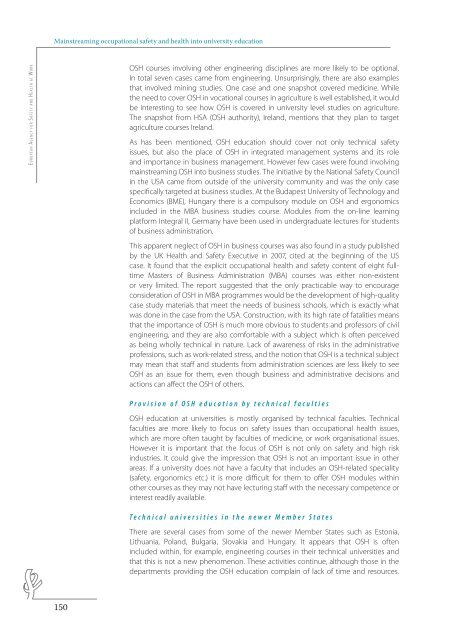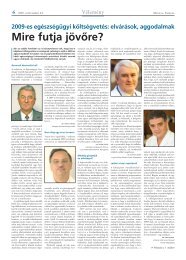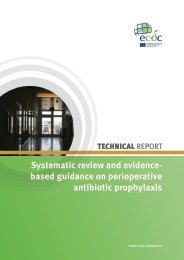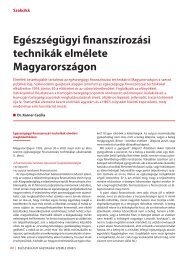Mainstreaming occupational safety and health into university ...
Mainstreaming occupational safety and health into university ...
Mainstreaming occupational safety and health into university ...
Create successful ePaper yourself
Turn your PDF publications into a flip-book with our unique Google optimized e-Paper software.
<strong>Mainstreaming</strong> <strong>occupational</strong> <strong>safety</strong> <strong>and</strong> <strong>health</strong> <strong>into</strong> <strong>university</strong> educationE u r o p e a n Ag e n c y f o r Sa f e t y a n d He a l t h a t Wo r kOSH courses involving other engineering disciplines are more likely to be optional.In total seven cases came from engineering. Unsurprisingly, there are also examplesthat involved mining studies. One case <strong>and</strong> one snapshot covered medicine. Whilethe need to cover OSH in vocational courses in agriculture is well established, it wouldbe interesting to see how OSH is covered in <strong>university</strong> level studies on agriculture.The snapshot from HSA (OSH authority), Irel<strong>and</strong>, mentions that they plan to targetagriculture courses Irel<strong>and</strong>.As has been mentioned, OSH education should cover not only technical <strong>safety</strong>issues, but also the place of OSH in integrated management systems <strong>and</strong> its role<strong>and</strong> importance in business management. However few cases were found involvingmainstreaming OSH <strong>into</strong> business studies. The initiative by the National Safety Councilin the USA came from outside of the <strong>university</strong> community <strong>and</strong> was the only casespecifically targeted at business studies. At the Budapest University of Technology <strong>and</strong>Economics (BME), Hungary there is a compulsory module on OSH <strong>and</strong> ergonomicsincluded in the MBA business studies course. Modules from the on-line learningplatform Integral II, Germany have been used in undergraduate lectures for studentsof business administration.This apparent neglect of OSH in business courses was also found in a study publishedby the UK Health <strong>and</strong> Safety Executive in 2007, cited at the beginning of the UScase. It found that the explicit <strong>occupational</strong> <strong>health</strong> <strong>and</strong> <strong>safety</strong> content of eight fulltimeMasters of Business Administration (MBA) courses was either non-existentor very limited. The report suggested that the only practicable way to encourageconsideration of OSH in MBA programmes would be the development of high-qualitycase study materials that meet the needs of business schools, which is exactly whatwas done in the case from the USA. Construction, with its high rate of fatalities meansthat the importance of OSH is much more obvious to students <strong>and</strong> professors of civilengineering, <strong>and</strong> they are also comfortable with a subject which is often perceivedas being wholly technical in nature. Lack of awareness of risks in the administrativeprofessions, such as work-related stress, <strong>and</strong> the notion that OSH is a technical subjectmay mean that staff <strong>and</strong> students from administration sciences are less likely to seeOSH as an issue for them, even though business <strong>and</strong> administrative decisions <strong>and</strong>actions can affect the OSH of others.Provision of OSH education by technical facultiesOSH education at universities is mostly organised by technical faculties. Technicalfaculties are more likely to focus on <strong>safety</strong> issues than <strong>occupational</strong> <strong>health</strong> issues,which are more often taught by faculties of medicine, or work organisational issues.However it is important that the focus of OSH is not only on <strong>safety</strong> <strong>and</strong> high riskindustries. It could give the impression that OSH is not an important issue in otherareas. If a <strong>university</strong> does not have a faculty that includes an OSH-related speciality(<strong>safety</strong>, ergonomics etc.) it is more difficult for them to offer OSH modules withinother courses as they may not have lecturing staff with the necessary competence orinterest readily available.Technical universities in the newer Member StatesThere are several cases from some of the newer Member States such as Estonia,Lithuania, Pol<strong>and</strong>, Bulgaria, Slovakia <strong>and</strong> Hungary. It appears that OSH is oftenincluded within, for example, engineering courses in their technical universities <strong>and</strong>that this is not a new phenomenon. These activities continue, although those in thedepartments providing the OSH education complain of lack of time <strong>and</strong> resources.150
















